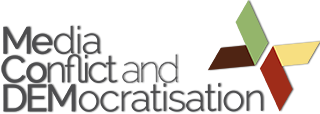Katrin Voltmer and Lone Sorensen have written a paper on democratisation in an age of media abundance. It is now available!
Download at: http://www.mecodem.eu/publications/working-papers
Executive Summary
The paper applies the concept of ‘mediatisation’ as a theoretical framework to transitional democracies. In doing so it addresses the question of how recent changes in the media environment impact on the dynamics and outcomes of struggles for democratic transition. The argument is based on two propositions: First, mediatisation is best understood as a transformative process that defies clear cause-effect attributions. Second, besides journalistic media as institutions of public communication, communication technologies have also to be considered as a crucial factor that drives the mediatisation of politics, and indeed transitional politics. We conclude by pointing out that mediatisation in emerging democracies is a multi-faceted and often ambiguous process that is shaped by the political, social and cultural context in which it takes place. It thus results in different configurations of the media-politics nexus than in established western democracies, at times serving to strengthen democratic transition, at others to undermine it.
The paper:
- Presents an outline of the concept of ‘mediatisation’, which provides a conceptual framework for understanding how an ever expanding media sphere interacts with and shapes public communication and ultimately the institutional processes of democratic politics. The focus is on aspects of political communication but also brings in technological perspectives of media and communication to broaden the largely institutional understanding of mediatisation in the political communication field.
- Discusses the communicative dimension of democratisation – the way in which the communication environment creates opportunities as well as constraints for democratic transformations and how in turn the transition process re-configures public communication.
- Addresses questions around the quality of emerging ‘fourth wave’ democracies: to what extent they provide spaces for effective participation and allow for a comprehensive mechanism of accountability. We focus on two aspects of this: the transformation of citizenship and how citizens incorporate media and communication technologies in their activism and how this affects grassroots mobilisation; and the transformation of power and how political leaders and governments adjust to ‘media logic’, thereby giving way to new institutional forms of representation.
